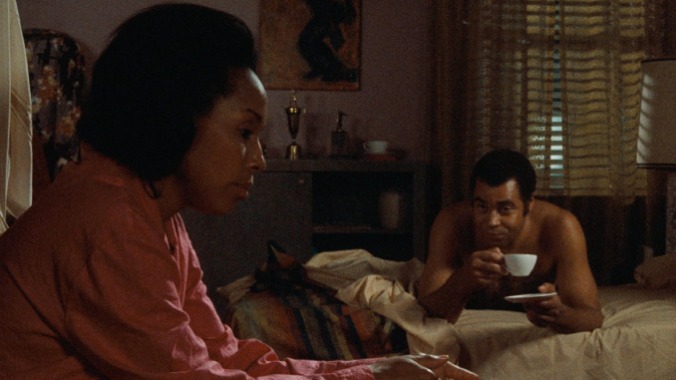
In his recently-released Blaxploitation history Black Caesars and Foxy Cleopatras, Boston Globe film critic Odie Henderson devotes a chapter to his favorite rom-com of all time, the inner-city comedy-drama Claudine (which came out 50 years ago today). Already a fan of Blaxploitation films at the time, Henderson saw this story of a beautiful-but-harried single mom from Harlem and came to the conclusion that this is definitely not a Blaxploitation movie. “It’s one of the best examples of counterprogramming the era had to offer,” Henderson wrote, “and the kind of working-class comedy that was never offered to Black people.”
Yes, while the Blaxploitation era mostly consisted of badass brothas and sistas whooping the asses of figures—gangsters, drug dealers, the MAN!—who were trying to keep the Black community down, Claudine was a complete 180 from all those righteous-but-over-the-top spectacles.
Diahann Carroll stars as the title character, a mother of six kids—the result of two marriages and two “almost marriages”—who supports these ragamuffins by housekeeping for a white couple and getting welfare. Her kinder are definitely a foul-mouthed bunch: They include oldest child Charles (Lawrence Hilton-Jacobs AKA Welcome Back, Kotter’s Freddie “Boom-Boom” Washington), a surly, wannabe revolutionary; her second-oldest Charlene (Tamu Blackwell), who’s been learning how to drink with some unseen guy named Abdullah (formerly Teddy); and youngest boy Francis (Eric Jones), a quiet kid who longs to be invisible. A young Laurence Fishburne was originally cast as the second-youngest son, but was fired with other castmates after the originally cast Claudine, Diana Sands, died.
Despite being middle-aged and consistently running ragged, Carroll’s Claudine still catches the eye of Rupert P. Marshall (James Earl Jones), a smooth-talking garbageman who takes her to his place for a relaxing date—which mostly consists of a bubble bath, a bucket of fried chicken and a roll in the hay.
The first half of the movie has Claudine trying to maintain a no-strings-attached “project” with Marshall (“Roop” to his peoples), while also raising her kids and keeping “Mr. Welfare” from finding out she’s been cheating on him. (Whenever the lily-white welfare lady comes, she and the kids have to hide anything that looks remotely new.) Eventually, Claudine catches feelings for the trash man, especially when he starts becoming a father figure to the little ones.
For a movie written and directed by white folk (as usually was the way during the Blaxploitation years), Claudine is surprisingly spot-on in its portrayal of living in lower-income America. Blacklisted director John Berry stepped in when African-American stage/screen vet Ossie Davis bowed out of directing. Berry took married screenwriters Lester and Tina Pine’s script and crafted a movie that speaks more about the Black experience than any Blaxploitation movie did at the time. (By the way, the Pines previously wrote the 1969 film Popi, where Alan Arkin starred as a Puerto Rican widower raising two boys in Spanish Harlem.)
Shot on a $1.1 million budget, Claudine maintains a gruff, gritty vision of 1970s Harlem, where hookers are your next-door neighbors and a scurrying mouse can interrupt some sweet lovemaking. It mostly takes jabs at our country’s bureaucratic tendency to keep poor Black folks broke. At one point, Claudine and Roop consider getting married just to get the welfare sticklers (The Jeffersons co-star/Lenny Kravitz’s momma Roxie Roker shows up as a welfare worker in one scene) off both their backs.
The characters—and the story—fight to remain optimistic, even when the second half lays on the drama and has our heroine dealing with one disappointment after another. One thing that enhances the sunniness is the film’s score, composed by Curtis Mayfield and performed by Gladys Knight & the Pips. Just like when he did the classic soundtrack for Super Fly, Mayfield creates grooving numbers that also serve as funky narration, often commenting on the feelings and emotions of the characters on-screen.
Even when her back is continuously pinned against the wall, Carroll remains both radiant and resilient throughout this. In a role that the late Sands had to turn down when she got sick with cancer, the future Dynasty diva—best known at the time as the star of the groundbreaking sitcom Julia—had to prove she could pull off playing an unglamorous working mother. (She said she didn’t wear any makeup during filming, which unfortunately made her look even more naturally stunning.) She did such an incredible job, she received an Academy Award nomination for Best Actress for her performance.
Carroll has wonderful chemistry with Jones, who gives his most suave, romantic performance. Even when he starts getting pressure from the tax man to pay more for his out-of-state kids, the man who voiced Darth Vader, Mufasa and other powerful mofos still does outstanding work playing that rarest of on-screen Black archetypes: A Black man who actually wants to be there for his girl and her kids.
Claudine grossed $6 million and became one of those beloved hood classics that inspired other Black artists to make different, more positive, more honest stories about Black people. In an interview that’s included in the Criterion Collection release that dropped in 2020, writer/director/comedian Robert Townsend (Hollywood Shuffle) revealed how much that movie influenced him as a filmmaker. He even hired Carroll to co-star in his beloved hood classic The Five Heartbeats. “When I saw the film, it just reminded me of my life,” said Townsend. “But it was also one of the few times I saw an authentic portrayal of people of color and it represented the hood the way I saw the hood—as a wonderful, beautiful thing.”
Craig D. Lindsey is a Houston-based writer. You can follow him on Twitter and Instagram at @unclecrizzle.